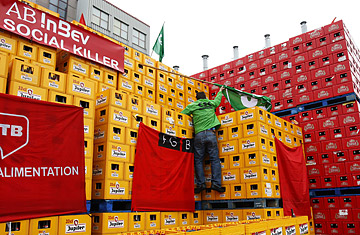
A worker climbs on racks of beer bottles blocking the entrances of Anheuser-Busch InBev's plant in Jupille, France
If there's one thing Belgium is known for above all else — more than Tintin, chocolate and female tennis stars — it's beer. The Belgians have a rich beer-making tradition dating back to the Middle Ages, with more than 125 breweries today; beer, it is said, is the very lifeblood of the country. But trouble is, ahem, brewing. Supplies of Belgium's top brands — Stella Artois, Hoegaarden and Leffe — are rapidly running low in bars and supermarkets as unions have set up blockades outside the country's largest breweries to protest proposed job cuts.
For nearly two weeks, picketers have stacked crates and set fires to block the entrances to the headquarters of Anheuser-Busch InBev, the world's largest brewer, in the city of Leuven, as well as other plants. The protesters have not only prevented any beer from leaving the breweries but also stopped the raw ingredients and packaging materials from getting in. At one point, workers at the Jupille plant, near Liège, even took their managers hostage for 11 hours, demanding to speak with the company's top officials, before finally letting them go the following morning. A few days later, the picketers tried a different approach, handing out free beer to passersby.
The 800 jobs on the chopping block in Europe — 10% of AB InBev's total European workforce — may be a mere ripple compared with the tidal wave of layoffs around the world in the past year. But the proposed cuts — about a third of which would be in Belgium — follow the company's announcement of profits of $1.55 billion in the third quarter of last year. This has angered the Belgian unions, which are taking a stand against what they see as an affront to the country's beer-making tradition. "This is the ugly face of capitalism," says Roger Van Vlasselaer, who heads the Flemish Brabant section of the ABVV-FGTB, Belgium's main union. "AB InBev are just thinking of their bottom line for shareholders, regardless of the social cost. There is no reason at all to fire people."
But the company sees things differently. Although its headquarters are in Leuven, where AB InBev can trace its brewing roots back to 1366, the firm's power brokers are Brazilian investment bankers who manage a global empire with a workforce of 120,000 and more than 200 brands of beer, including Beck's, Labatt, Bass and Löwenbräu. It has expanded rapidly, following a series of rapacious mergers and acquisitions in recent years, most notably its takeover of Budweiser brewer Anheuser-Busch in 2008 — after which InBev became AB InBev. But that move also saddled the company with huge debts that it is still struggling to pay off. Last year, it sold its entertainment business, including six SeaWorld parks and two Busch Gardens parks in the U.S. It has also shed its Irish and Scottish businesses and its Central European operations.
Yet the biggest problem AB InBev faces is the downward trend in beer consumption in Europe. The company says European drinkers have been gradually switching to wine and spirits in recent years, causing sales of beer to decline sharply. In beer-loving Belgium, the problem has been particularly acute: beer sales plummeted 20% from 2000 to 2008. One reason for this, according to the market-research firm Euromonitor International, is that the Belgian population is aging and thus less likely to go out to bars to drink. And the trend shows little sign of reversing. Fifty years ago, the average Belgian drank 118 liters of beer a year. Today, the figure is 86 liters.
Despite the fact that the country is drinking less beer, Belgium has cemented its global brewing reputation with an effective export strategy: in 2007, 57% of the beer produced in the country was exported, up from 37% in 2000 and 7% in 1970. But global sales have taken a hit in the recession, particularly in emerging markets like Brazil and Russia, which had been the cornerstones of the company's business in recent years.
On Jan. 15, AB InBev won a court ruling to end the blockade. The company's management says it still prefers to seek a negotiated solution with its workers, but the unions have threatened a full strike if the ruling is enforced. In the end, there is probably little the unions can do to prevent the job cuts, says Theo Vervloet, chairman of the Belgian Brewers trade association. "AB InBev is thinking on a bigger scale and wants to go for volume rather than quality," he says. In other words, AB InBev is focusing on a grand strategy, which means that what happens in Belgium now is small beer.
